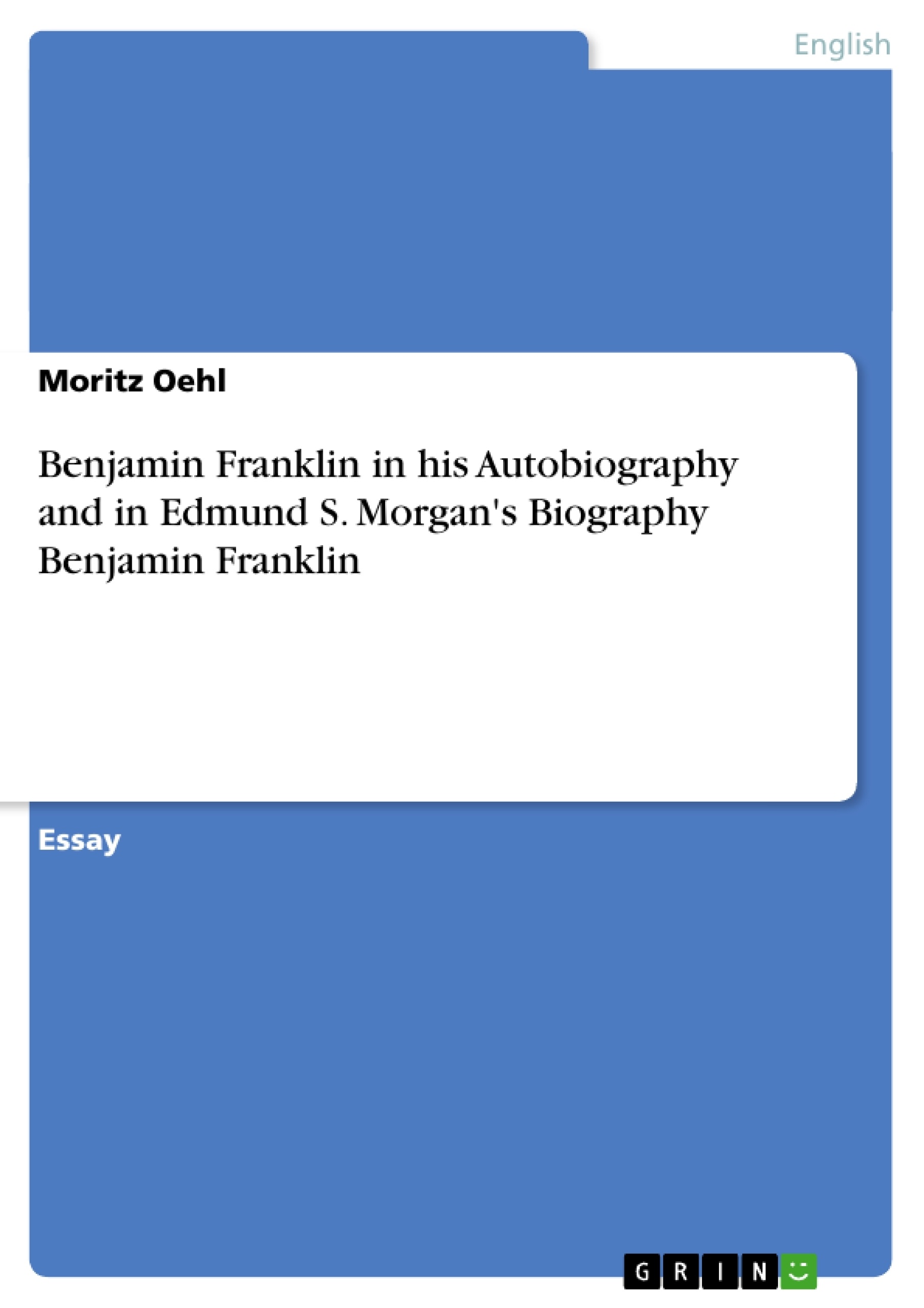Benjamin Franklin was the first American hero. He was essential in formulating America’s cause and his role in the peace negotiations with England made him an idol for generations. In his Autobiography the reader can follow the course of his life until his 30th birthday. Although he does not give any accounts on his role in achieving American Independence, his work delivers a good impression on his character. Nevertheless, to understand Franklin more thoroughly it is essential to consider a modern biography about him. In comparison to the Autobiography which lays stress on his attitude and principles towards life, Edmund S. Morgan’s work Benjamin Franklin estimates his achievements for America by using these principles as an explanation for his success. When comparing Franklin’s own story about his life with any other biography, we have to take into account whom he addresses with his writing. The first part of the Autobiography is dedicated to his son William and is written while the old man is on a political mission in England in 17711. Unlike Morgan’s Benjamin Franklin, published in 2002 and written for a broad audience, Franklin did not explicitly address the public with the first part of his work. Even though the Autobiography has by today been published and distributed all over the world, it is crucial to consider that its initial purpose was only to inform his son.
Inhaltsverzeichnis (Table of Contents)
- Benjamin Franklin in his Autobiography and in Edmund S. Morgan's Biography Benjamin Franklin
-
Comparing Franklin's Autobiography with Morgan's Biography
- Early Years and Professional Life
- Franklin's Writings, the Junto, and the Founding of the Subscription Library
- Franklin's Moral Principles and Political Beginnings
- The Second Part of the Autobiography and Franklin's Reputation
- The Third Part of the Autobiography: Franklin's Role in the American Revolution
Zielsetzung und Themenschwerpunkte (Objectives and Key Themes)
The objective of this text is to compare and contrast Benjamin Franklin's Autobiography with Edmund S. Morgan's biography of Franklin, focusing on their differing perspectives on Franklin's early life, moral principles, and political career. The comparison sheds light on the complex and multifaceted personality of one of America's founding fathers.
- The importance of Franklin's early life and professional development as a printer
- Franklin's moral principles and his philosophy of achieving a satisfying life
- Franklin's role in the American Revolution and his dedication to public service
- The contrasting perspectives of Franklin and Morgan on Franklin's achievements
- The evolving nature of Franklin's autobiography as a work addressed to different audiences
Zusammenfassung der Kapitel (Chapter Summaries)
The text compares and contrasts Benjamin Franklin's autobiography with Edmund S. Morgan's biography of Franklin, focusing on the differences in how they portray Franklin's life and achievements. The first section compares their accounts of Franklin's early years, emphasizing the different emphasis placed on his profession as a printer. It also analyzes their perspectives on Franklin's writings, the Junto, and the founding of the Subscription Library.
The second section examines Franklin's moral principles as presented in his autobiography and how those principles are interpreted by Morgan. The third section focuses on Franklin's role in the American Revolution, contrasting Franklin's own account with Morgan's interpretation of his actions and motivations.
Schlüsselwörter (Keywords)
The text focuses on comparing and contrasting Benjamin Franklin's Autobiography with Edmund S. Morgan's biography, highlighting key themes such as Franklin's moral principles, his professional development as a printer, his role in the American Revolution, and the different perspectives of both authors on his life and achievements. The comparison emphasizes the complex nature of Franklin's character and the importance of understanding the different contexts and audiences for his writings.
Frequently Asked Questions
How does Franklin's Autobiography differ from Morgan's biography?
The Autobiography focuses on Franklin's personal attitudes and principles, while Morgan's biography estimates his achievements for America using those principles as an explanation for his success.
To whom was the first part of Franklin's Autobiography originally addressed?
The first part was originally a private document dedicated to his son, William, rather than a public address.
What role did the "Junto" play in Franklin's life?
The text discusses the Junto and the founding of the Subscription Library as key elements of Franklin's professional and social development.
Does the Autobiography cover Franklin's role in the American Revolution?
Franklin's own accounts in the Autobiography do not fully detail his role in achieving independence, which is why modern biographies like Morgan's are essential for a complete understanding.
What are the key themes of Franklin's moral philosophy mentioned?
The text highlights Franklin's moral principles and his specific philosophy for achieving a satisfying and successful life.
- Citation du texte
- Moritz Oehl (Auteur), 2002, Benjamin Franklin in his Autobiography and in Edmund S. Morgan's Biography Benjamin Franklin, Munich, GRIN Verlag, https://www.grin.com/document/33148



